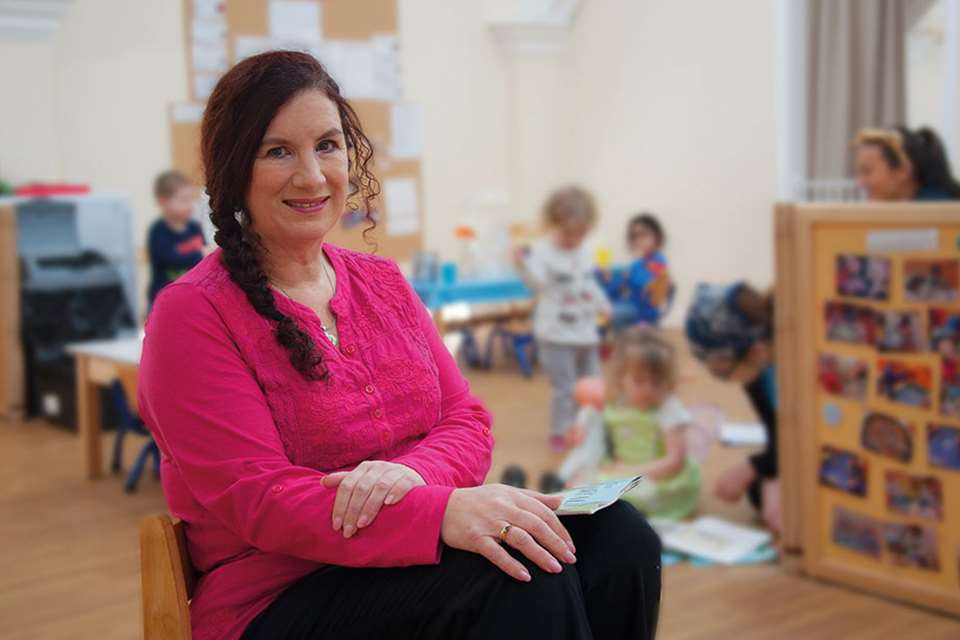30 Hours, Part 8: Newham - Full to bursting
Charlotte Goddard and James Hempsall
Monday, June 26, 2017
How are settings in the pilot area of Newham in London coping with the 30 hours entitlement? Charlotte Goddard reports

When the London borough of Newham first started looking into the delivery of 30 funded hours, it was obvious that the council faced a significant challenge. In Newham, the majority of three- and four-year-olds – 75 per cent, according to early years strategic lead Nicola Blatchly-Lewis – take up their free entitlement in school nursery classes or one of the borough’s seven maintained nursery schools. But the school nurseries are already almost full to capacity.
According to Government figures, every three- and four-year-old in Newham currently takes up their 15 hours’ entitlement, although Ms Blatchly-Lewis says a few still turn up to Reception having not attended any setting previously. Those who are entitled to the 30 hours are effectively taking up two nursery places, a potential problem in an over-subscribed sector.
‘Schools are the least flexible part of the early years sector, but we are testing what they are able to deliver, alone and in partnership with other providers,’ says Ms Blatchly-Lewis.
The majority of maintained provision currently offers blocks of hours in the morning or the afternoon, but 30-hours children will need to attend for a full school day.
‘One of the major challenges for schools is about how they deal with lunchtimes,’ says Ms Blatchly-Lewis. ‘Staffing at lunchtimes, and whether to charge for school lunch, have been a massive topic of conversation. In London, primary children get free school meals, and schools are wondering how they can offer a free lunch to everyone except the youngest children.’
School nurseries are coming up with solutions which include children bringing in packed lunches, and free meals being provided where possible.
MAKING IT WORK
The funding rate for the 30 hours is £4.92 across all settings, with the exception of maintained nurseries, which receive £7.20 for the first 15 hours, and £4.92 for the last 15. ‘One of the particular models we are interested in is the single site but joint provider; for example, with a school providing some hours, and an out-of-school provider providing wraparound care in the same place,’ says Ms Blatchly-Lewis.
Childminders and day nurseries already pick up some children from the schools where they are taking their 15 funded hours. ‘There is work to do around formalising these partnerships, resulting in better information sharing around the child, and we want to start focusing on that in the final run-up to September.’
Newham was asked to particularly focus on how the 30 hours can benefit children with special educational needs and disabilities. ‘We are fortunate to have seven maintained nursery schools in our borough, and these have been leading on SEND delivery and high-resources provision,’ says Ms Blatchly-Lewis. One nursery, Ronald Openshaw (see case study) is the base for the SEND hub for Newham’s PVI sector, supporting the dissemination of good practice. This work is led by two area SENCOs who support 85 settings and more than 230 childminders with issues including assistance with early identification, making referrals to appropriate agencies, providing staff training, and offering peer coaching.
The council found a low take-up of funded hours from families whose children have SEND. ‘Perhaps because if you have children with additional needs, especially high needs, not many families have both parents working, so they would not be eligible,’ says Ms Blatchly-Lewis. There was a greater take-up among children with lower-level or emerging SEND. ‘We are devising and running an accredited training programme for Super SENCOs in the PVI sector,’ says Ms Blatchly-Lewis. ‘In Newham, we have moved to a locality-based way of working, and have identified a Super SENCO in each locality who will act as a point of contact for other providers, and a point of contact for area SENCOs.’
Providers have said they are concerned about the impact of the 30 hours on placements for children with SEND where they are struggling to meet the needs for 15 hours. ‘All settings are seeing a sharp increase in the numbers of children with SEND, which makes this even more pertinent,’ says Alison Lentz, head teacher at Ronald Openshaw. All early years settings will be taking part in free, council-commissioned training around behavioural support, from September.
The council was initially tasked with delivering 415 places in the pilot, but this was extended to 455. ‘Take-up has been popular because of the challenges of school places in inner London,’ says Ms Blatchly-Lewis. ‘Parents like to think if they get a place in a school nursery, that might be an indicator of getting a school place, although that is not the case.’
CASE STUDY: RONALD OPENSHAW
A maintained nursery school with 138 children on the roll, Ronald Openshaw Nursery Education Centre is delivering the funded 30 hours to 26 children, all of whom take all of their entitlement with the setting. When the programme rolls out in September, the nursery will not expand the number of places it offers, says head teacher Alison Lentz.
‘We must be mindful not to disadvantage those eligible for 15-hour places,’ she says. As a maintained nursery school, Ronald Openshaw receives £7.20 for the first 15 hours, falling to £4.92 for the next 15. ‘By delivering the 30 hours we are not breaking even, but we are running at less of a loss, because we had spaces on the roll this year,’ Ms Lentz says. ‘However, it is difficult to predict demand: there is a lot of housing going up locally. If we can pick up more 15-hours children, then that is what would benefit us financially.’
In the past, children attended for morning or afternoon sessions, with a 30-minute gap between, but 30-hours children attend for the whole day. This means they either pay for a meal or bring a packed lunch, and the setting has had to employ extra staff to enable this. ‘We thought most parents would want the meal but they can’t afford it,’ says Ms Lentz. ‘From September, packed lunches will be the only option.’
Since the nursery day is six and a half hours, parents can pay for the last half hour of the day, which brings in some extra funding. However, it is swings and roundabouts – when parents get a job and are eligible for the 30 hours, the setting often loses the Early Years Pupil Premium for those children.
Around a quarter of the children have additional needs. ‘That has an impact on support if they are eligible for the 30 hours – consistent quality support all day is expensive. But we look at ways of employing staff so it will benefit all of the children,’ says Ms Lentz.
Overall the 30 hours is a positive benefit, claims Ms Lentz. ‘It is a good social opportunity, and it is great to be in a consistent setting, with the same boundaries and so on,’ she says.
Double time
 James Hempsall, who has the support contract to aid delivery of the 30 hours, on the need for flexibility
James Hempsall, who has the support contract to aid delivery of the 30 hours, on the need for flexibility
The make-up of the early years sector varies from local area to local area. It is not uncommon for areas to have the vast majority of provision in the PVI sector or, like Newham, for delivery of most of the entitlements to be in schools.
As Newham identifies, schools are the least flexible part of the sector. And this must change. We cannot realistically expect early years entitlements to be delivered in old-style morning and afternoon blocks separated by a lunch break. At least, nowadays, there is lunchtime provision rather than expecting children to go home or only attend in the morning or afternoon.
Of course, any provider reading this will totally understand all the dilemmas and challenges that need to be addressed, including lunch break time, flexible staffing, lunch break charges, lunch meals/packed lunches, bookings outside of set blocks, meeting the needs of children with SEND, and balancing parent preferences with good business sense.
I say to schools: talk to your local PVI providers who have done much to resolve many of these quandaries. All of these practices are rightly being re-examined within the context of 30 hours, and new ways of working are emerging. They have been especially successful in staffing lunchtimes, and continued to view this time as an integral part of the EYFS day.
One barrier is the notion that places are for an additional 15 hours. The entitlement is for up to 30 hours. Yes, many parents will take their whole 30 hours, but many will be interested in something around 24 hours, and to have the ability to stretch this beyond school term times. In turn, schools can offer their perspective and insight to PVI providers. Such dialogue can be the start of fruitful exchanges and developing partnerships, as gaps in delivery are discussed, and opportunities emerge for all to achieve the best of both worlds.











